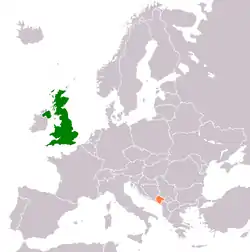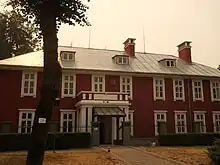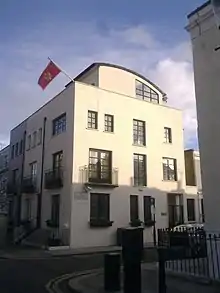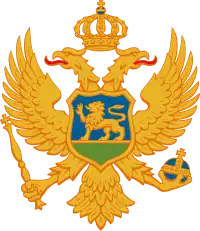 | |
United Kingdom |
Montenegro |
|---|---|
Montenegro–United Kingdom relations are the bilateral relations between Montenegro and the United Kingdom. Both nations are members of the Council of Europe and NATO and had fought on the same side in both World War I and World War II.
History
.jpg.webp)
In 1878, Great Britain recognised Montenegro as an independent and sovereign principality by the Congress of Berlin. During that period Britain maintained an embassy in the royal capital, Cetinje. The former British Embassy in Cetinje is still standing and is now the home of the University of Montenegro Music Academy.
After the dissolution of Serbia and Montenegro, the UK recognised Montenegro as an independent state and established diplomatic relations on 13 June 2006. The UK then upgraded its British Office in Podgorica. The Duke of York visited Montenegro to officially open the new British Embassy in Podgorica in March 2009.
Montenegro opened an embassy in London in September 2007 (the former Embassy of Serbia and Montenegro in London became the Embassy of the Republic of Serbia on 5 June 2006).[1]
Cultural relations
.jpg.webp)


The British Council has been operating in Podgorica since 1994 and is co-located with the embassy. British Council in Montenegro is nurturing cultural relations between the United Kingdom and Montenegro through its project work in the fields of education, creative industries, governance and English language, and also through maintaining and developing networks with governmental, non-governmental and international organisations locally.
Diaspora
The 2001 UK Census recorded 31,244 people born in the former state of Serbia and Montenegro, which are now the independent states of Serbia and Montenegro.[2]
Politics
The United Kingdom strongly supports Montenegrin membership into the European Union and NATO.[3]
See also
References
- ↑ "Country Profile". Montenegro. Government Web Archives. Archived from the original on 12 December 2012. Retrieved 21 November 2014.
- ↑ "Country-of-birth database". Organisation for Economic Co-operation and Development. Retrieved 2008-09-20.
- ↑ "Owen Jenkins of Foreign Office: United Kingdom to provide support to Montenegro's EU, NATO bid". GOVERNMENT OF MONTENEGRO. Retrieved 21 November 2014.
